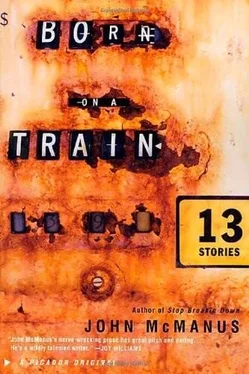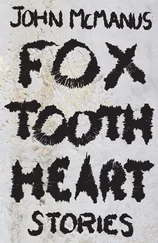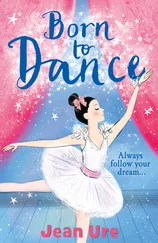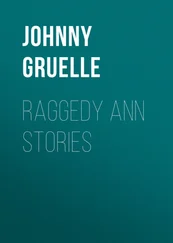You, said the little doll that was Letitia.
I brought you into this world, said Mommy, who was larger.
You keep having babies. Go have your babies somewhere else.
They’re your brothers.
I don’t want brothers, said Letitia’s doll. Just cats.
Wendy tried to dance a fox-trot, but her corncob wouldn’t bend that way; it cracked.
You can talk to us now, said Letitia’s doll to Daddy, whose body looked exactly like Letitia’s, only bigger. Tell me about when you were a boy. Why do ghosts fly through our house, why do comets streak each night ten feet above my bedroom, but the doll refused to say a word; it lay in silence on the stump. It had a glint in its eyes like woodfire.
Why do the signs glow? What do the spaceships want? She saw them every night above her ceiling. She didn’t like her house. Daddy said it someday could be hers, but she didn’t believe him. It wasn’t long for the world. Yellow war machines would come, exhume the dirt, the buried skeletons of kittens. Chariots would crash into each other in the sky and lie as bait for wailing sirens, ambulances, trucks with shiny ladders mounted on the sides.
I love you, said Letitia’s doll to Mommy.
It’s too late, was the reply.
I didn’t really choose. I flipped a coin.
You flipped wrong.
Letitia shuddered. Her mind split wide like separating highways: she was floating there above the farm, she was in the Cavalier with Wendy, she was dizzy from her body’s need for sugar. Her eyes were closed, unconscious; she was the girl. She knew where all those corncobs ended up: in the graves of animals, in ashes like the horse, in Mommy’s grave. Mommy had died young, of blood clots. They tore up her grave when they built the interstate. Letitia was a wife by then, a mother, overworked; she didn’t pay attention. Graves were only sentimental things. She never said good-bye to her cemetery of dead brown cats, years and years of them, each with its own rock headstone etched by gravel. None had ever died upon the road, but now ten thousand cars a day ran over them.
There was the rabid Burmese tom, there was Flavia whose tail had two kinks. There was lynx-point Louis, killed by Wendy’s boyfriend Truss, the dreamy blond-haired boy with pale blue eyes, a serpent’s nose, a lisp. He pushed it down the chimney. It was August so the hearth bore neither fire nor starter log when Louis shattered like a brick. Ashes dusted his ruffled fur and stained the lacy frills of Letitia’s dress. She carried him to the creek bank, where a weeping willow’s branches hid the joined forms of Truss and Wendy, and she sneezed when the willow’s branches touched her nose. The cat had died with all its claws on point, and she threw it forward. Truss screamed. His supple body bled from four matched sets of holes, and Wendy held him back. He screamed words Letitia had never heard out aloud — they were words the spaceships’ pilots used to curse each other, morning noon and night. She listened more closely after that; she’d never known they might be speaking straight to her. She was older by then — fifteen or thereabouts. She grew her hair long.
Wendy wept that night for hours. All I told him was piss into the chimney, she told Letitia.
Well, that’s not what he did.
No, Wendy cried, it’s not.
I don’t think I like you anymore.
Please don’t tell Daddy.
Why would I tell Daddy? said Letitia. He wouldn’t care.
He’d kill me.
Letitia wanted to cry too; she had desecrated Louis’s corpse by throwing him on Truss, whom she liked too, whom she could never like again. Does it make you feel better to pretend that? she asked Wendy.
Stop it, Wendy said. Don’t be mean to me. Shut up.
I like to pretend things too, Letitia said.
Like what?
Letitia shook her head.
What? said Wendy. What?
I’ll never tell you what they are.
Don’t be mean to me, said Wendy. Now of all times.
When then? said Letitia. Tomorrow? Fifty years from now?
Wendy shook her head and cried herself to sleep. Letitia rocked in a hammock on the porch. Don’t ask me questions anymore, she told her sleeping sister. She wished everyone would go away, but Truss returned next morning and flipped her hammock over so she woke up crashing on the porch’s planks of wood. He climbed the stairs to Wendy’s room and married her and named a son in six months’ time, and five more by the age of twenty-seven. He left to be a trucker. Every few weekends he would come home, and once he even brought a cat himself, a rip-eared sablecoat. He died in a car crash when Wendy was still half-pretty, and the cat lived on. Wendy moved to Myrtle Beach to be a waitress and when she came home twelve years later the chimney was gone, as well as the house, as well as the barn. The hills were flat; the creek was underground. Wendy said she didn’t care that the house had been destroyed; she was a pragmatist like Mommy. It was ugly anyway, she said. It was too square.
Already Mommy’s face was gone. It was a white plate, smooth, not shattered, featureless. She had been rich and fat. She was You, because that was Letitia’s only memory of her mother’s nose and eyes and how the varicose veins were highway clover-leafs upon her legs from where Letitia always sat and wished she had some other girl to play with, but it was the countryside. She tried to remember why she’d even said it, but she had trouble remembering how old she was, or whether she was allergic to certain flowers.
If you can see the future, why can’t I?
Because you’re too old.
Letitia looked at herself and saw that it was true. Her wrinkles ran deep, and she quivered. She touched the girl, even though her memory held no record of a crippled ghost who stroked her hair, caressed her cheek. The meeting of their skins was like a sonic boom. You, she said, and brought their worlds together. The road buckled like continental plates colliding when her family’s farmhouse materialized a thousand feet behind her car. Only the roof and gables rose above the surface of the pavement, only the brick chimney, the old black oak. Speeding cars were trapped inside the attic. A Toyota Previa was sliced in two by the eastside wall; its front half crashed into a red Eclipse that slammed against a Ram. The girl blinked her eyes. In an instant trees grew centuries tall and felt the head-on impact of a fleet of Schneider trucks that mashed their bark to powder, dust. Letitia flinched and cried out, Wendy, who was crushed by an Eagle Vision, and she passed away too soon to see the cats’ graves rise from beneath the roadbed, all together. How they danced. The cars didn’t even crush them; all the cars had crashed, and the road was free of traffic. Now Wendy could open her door safely.
I’m glad we broke down, Letitia said. I never would have seen these things again. The cats, the silk bandanna Mommy gave her, the trees she’d climbed: they rose. Mommy gave her many things — diseases, kittens, fears inherited, the swath of ruby silk that rose up through the ground along with all the things she’d ever lost, like poltergeists aglide as timelines merged so Wendy lived again, so she was in Alabama, dancing. The girl led Letitia through the catacombs of all her old belongings, through the house where cars had fallen through the floor into the kitchen, to the cellar shelf where Daddy kept his wine that turned to vinegar. It made her mad to feel what it was like to float, to know what had been stolen to have lived inside her body. She hadn’t moved like that for thirty years. She was jealous of the girl, wanted to make her cry, so she opened her mouth wide. This is what you’re going to look like, Letitia said. For many, many years.
But the girl wasn’t listening. She cradled corncob Wendy in her arms. We’ve got the okra planted, she was saying. Me and Daddy did it on our own.
Читать дальше












